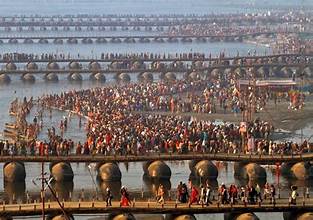The Importance of Silent Bathing on Mauni Amavasya
According to Chapter 35 of the Vrat Chandrika Utsav, Mauni Amavasya, also known as the silent new moon day, holds great significance during the month of Magha. On this day, it is prescribed to take a bath in the Ganges while observing silence. If Mauni Amavasya falls on a Monday, its merit increases manifold. Triveni bathing in the month of Magha is considered highly auspicious. Consequently, many devotees, both men and women, reside near the confluence for the entire month of Magha, a practice also known as “Kapil Vas,” possibly derived from the term “Kalpvas.”
Observances During the Month of Magha
During the month of Magha, some individuals observe fasts for the entire month, while others practice only fruitarianism. Following certain rules such as not using gold on the mat, refraining from applying oil, avoiding any form of adornment, and maintaining self-discipline becomes imperative. The grandest festival of bathing during the Magha month is indeed Mauni Amavasya. On this day, although Ganga bathing is common in all cities, a massive gathering occurs in Prayag.
Historical Significance
During the Kumbh Mela in 1930, approximately 3.5 million people bathed at the confluence on Mauni Amavasya. The massive gathering gives an estimate of the magnitude of that grand assembly. The resonance of Ganga Maai echoes with powerful vigor. At the confluence of Triveni, heads were visible as far as the eye could see. Even if a coin were thrown, it wouldn’t sink. Witnessing the boundless devotion and profound reverence of people towards the Ganges fills the heart with awe. Describing the significance of Triveni bathing on Mauni Amavasya seems beyond words.
Mythological References
Kalidasa himself wrote that those who bathe at this confluence attain immediate liberation:
“Samudrapalyojaka sannipate, pootatmanamashrita kritabhishekata। Tatva vashodhena vinapi bhuyah, tanutyajo nasti sharirabandhah॥”
This verse suggests that one should bathe in the name of the Lord around the sea or water. Such bathing not only prevents the elements from becoming toxic again but also liberates the body from any bonds.
Disclaimer : इस न्यूज़ पोर्टल को बेहतर बनाने में सहायता करें और किसी खबर या अंश मे कोई गलती हो या सूचना / तथ्य में कोई कमी हो अथवा कोई कॉपीराइट आपत्ति हो तो वह jansandeshonline@gmail.com पर सूचित करें। साथ ही साथ पूरी जानकारी तथ्य के साथ दें। जिससे आलेख को सही किया जा सके या हटाया जा सके ।














